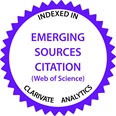Tytuł
Ujęcie dezinformacji naukowej w kontekście wymagań i wyzwań inteligentnego świata i inteligentnych organizacji
ORCID
Joanna Żukowska: 0000-0001-9589-3056
Agnieszka Mikołajewska: 0000-0002-7196-5198
Katarzyna Staniszewska: 0000-0002-7575-6123
Keywords
smart world, Industry 4.0, smart organization, pseudoscience, fake news, predatory journals, cognitive bias, misinformation
Słowa kluczowe
inteligentny świat,Przemysł 4.0,inteligentna organizacja,pseudonauka,fake news,drapieżne czasopisma,błąd poznawczy,dezinformacja naukowa
Abstract
Purpose: The purpose of the article is to focus on the topic of scientific misinformation, addressing key concepts and related issues covered over the last decade in publications in the following databases: Emerald, Ebsco, and Springer. The authors attempt to answer the question on the causes of the emergence of fake science and draw attention to the consequences of pseudoscience in the smart world shaped by technological advances in the fourth industrial revolution. As a practical premise, the article discusses the methods of combating pseudoscience and refers to the measures undertaken in this matter. Design/methodology/approach: The method of desk research; the frequency analysis of misinformation related terms, especially in the context of the smart world and smart organizations. Findings: The analyses of the theoretical aspect of fake science lead to the conclusion that due to the complexity of the phenomenon and significant negative social impact, the issue of scientific misinformation requires further empirical exploration as it remains a challenge for all stakeholders in society, organizations themselves included. The need to challenge false science is especially essential in the context of internetworked and knowledge-driven, smart organizations, which are becoming popular in the smart world. As information can be distorted, exaggerated, or fabricated to mislead recipients on purpose, organizations need to get involved in the prevention of misinformation as well. Research limitations/implications: It should be emphasized that this article is a theoretical introduction to the problem of scientific misinformation which requires further research on the reliability of scientific studies, especially in the field of institutional structures that enable the publication of works and data of low scientific quality. Originality/value: The article touches upon an essential and current issue for the field of both management science and organizations, although it should be treated as just an introduction to the problem concerned.
Abstrakt
Cel: przedstawienie zagadnienia dezinformacji naukowej, z uwzględnieniem kluczowych pojęć i aspektów podejmowanych w ciągu ostatniej dekady w publikacjach dostępnych w bazach danych: Emerald, Ebsco i Springer, zwłaszcza w kontekście smart world i inteligentnych organizacji. W artykule omówiono sposoby walki z pseudonauką i wskazano na działania podejmowane w tym zakresie. Autorki podejmują próbę wskazania przyczyn powstawania dezinformacji naukowej oraz konsekwencji występowania tego zjawiska w inteligentnym świecie kształtowanym przez postęp technologiczny czwartej rewolucji przemysłowej. Metodologia: analizę oparto na kwerendzie artykułów i analizie częstotliwości występowania pojęć związanych z dezinformacją naukową. Wyniki: analiza zagadnienia dezinformacji naukowej w ujęciu teoretycznym prowadzi do wniosku, że ze względu na złożoność zjawiska i negatywny wpływ, jaki dezinformacja wywiera na społeczeństwo, będąc wyzwaniem dla organizacji i interesariuszy, zagadnienie to wymaga dalszych badań empirycznych. Potrzeba zwalczania dezinformacji naukowej jest szczególnie istotna w kontekście inteligentnych organizacji opartych na sieci internetowej, bazujących na wiedzy, prowadzących działalność w inteligentnym świecie. Ponieważ informacje mogą być zniekształcone, wyolbrzymione lub celowo wymyślone, aby wprowadzić odbiorców w błąd, same organizacje stają przed wyzwaniem zapobiegania dezinformacji. Ograniczenia/implikacje badawcze: artykuł stanowi teoretyczne wprowadzenie do problemu dezinformacji naukowej, wymagającej dalszych badań nad wiarygodnością opracowań naukowych, zwłaszcza w zakresie struktur instytucjonalnych umożliwiających publikowanie prac i danych o niskiej jakości. Oryginalność/wartość: artykuł porusza istotne i aktualne zagadnienie z punktu widzenia zarówno nauk o zarządzaniu, jak i organizacji.
Recommended Citation
Żukowska, J., Mikołajewska, A., & Staniszewska, K. (2022). Scientific Misinformation in the Light of the Smart World and Smart Organizations. Imperatives and Challenges. Problemy Zarządzania, 20(2), 252-268. https://doi.org/10.7172/1644-9584.96.13
First Page
252
Last Page
268
Page Count
16
DOI
10.7172/1644-9584.96.13
Publisher
University of Warsaw







